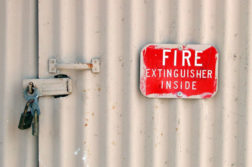Corporal punishment in Australia schools remains on the books in some states. But it’s effectively over regardless, writes Alan Corbett.
In April this year, Christian Community Ministries Ltd (CCM), the company which currently owns and operates 13 Christian Schools across Australia, directed its schools to cease using corporal punishment.
In reality this direction only applied to two Queensland schools – Chinchilla Christian College and its most recent acquisition, Hervey Bay Christian Academy – both of which had policies that permitted corporal punishment, or corporal discipline as CCM describes it.
While we can’t be certain, as there are no official statistics to prove otherwise, CCM’s direction probably marked the end of corporal punishment in Australian schools for three reasons.
First, corporal punishment has not been used in any government school for some years because of government legislation, regulation or policy. Second, only Queensland and South Australia permit its use in non-government schools; and third, the last South Australian non-government school known to have used corporal punishment – Craigmore Christian School (now called Hope Christian School) – had ceased using it about 4 or 5 years ago.
That just left the two Queensland schools mentioned above to abide by CCM’s direction.
It is interesting to note that (and I do not suggest any relationship here) some 10 months before CCM issued its direction, there was an almighty outcry among educators when Kevin Donnelly, an education adviser to the then Federal Education Minister Christopher Pyne, made statements in support of corporal punishment.
Although Donnelly never said he wanted the reintroduction of corporal punishment, he did acknowledge that if a parent community supported its proper use, then that was OK with him.
It was this particular comment that was described in an open letter by Australian education academics as reckless, inappropriate and an endorsement of archaic attitudes and practices.
The letter also called for Donnelly’s removal as an educational adviser on any educational matters related to children, and also called on the federal government to amend legislation to ensure that all children were protected from all forms of corporal punishment.
This incident demonstrated that corporal punishment was still an on-going and contentious issue and highlighted Australia’s continued failure by omission to fulfil its international obligations in this and other areas.
A punishing history
Over 20 years ago, the NSW Carr Labor government successfully passed legislation to end the use of corporal punishment in both government and non-government schools. NSW thus became the first Australian educational jurisdiction to do so.
NSW’s 1995 ban under one piece of legislation was then duplicated by the ACT (1997), Tasmania (1999) Victoria (2006) and, most recently, Northern Territory in 2015. Western Australia banned its use in government schools in 2000 but it wasn’t until 2015 that the ban was extended to non-government schools.
As for the other two states, South Australia banned the use of corporal punishment in government schools in 1991 as did Queensland in 1995.
However, non-government schools in each of these states were – and still are – permitted to use this archaic forms of punishment.
Here is the current position for each of the states and territories towards corporal punishment:
Australian Capital Territory
Corporal punishment is banned in all schools under the Education Act 2004 Part 1.2 Section 7(4).
New South Wales
Corporal punishment is prohibited under the Education Act 2015. Section 35 (2A) relates to the ban in government schools and Section “47 (h) to non-government schools.
Northern Territory
Corporal punishment has been banned in all schools under Division 1, Section 162, of the Education Act 2015, which came into force on 2 Jan 2016. Previously, the Criminal Code Act Division 2 (11) made it lawful for teachers in government schools to use corporal punishment unless parents expressly withheld their consent to such forms of correction. Section 162 (3) of the new Education Act (2015) has explicitly removed this right from teachers.
Queensland
In 1992, the Minister for Education, Paul Braddy stated that State Cabinet had approved changes to education regulations which would mean corporal punishment would be formally abolished in Queensland State Schools by 1995. However, corporal punishment in non-government schools remained unchanged and is still permitted under Section 280 of the Crimes Act (1899).
In correspondence with the author, successive education ministers have argued against a ban in non-government schools for three reasons. Namely, corporal punishment is legal under Section 280, non-government schools are autonomous with respect to policies to do with behaviour management and those school communities which support its use know what is best for their children. Neither the current Labor government nor the LNP opposition has responded to numerous representations for change.
South Australia
In 1991, the SA government repealed provisions in Section 38(1) of the Education (General Provisions Act 1989 that allowed for the corporal punishment of male students in government schools. See page 6 in the “Papers” of the Votes and Proceedings of the House of Assembly, 8 August 1991. However, since then no action had been taken to protect children in non-government schools from the harm caused by corporal punishment, and this is rather puzzling for a few reasons. South Australia is state with a long socially progressive history so one could reasonably expect it to have a more enlightened approach to the punishment of school children.
Furthermore, the Department for Education and Child Development relies on a 2011 document (prepared in collaboration with the Catholic and Independent Schools sectors) to inform and update staff working in schools and children’s services about the vital role they play in preventing and responding to child abuse and neglect. The document clearly states on page 9 that corporal punishment is not appropriate and a violation of physical contact boundaries, yet successive governments have chosen not to act in a manner consistent with their own policy.
It would also appear that the teaching profession itself doesn’t want corporal punishment. A 2011 survey, published in 2012 by the University of South Australia, researched the views of teachers about student behaviour in SA schools. One part of the study asked teachers to nominate what could be done to improve student behaviour. One suggestion was “reintroducing corporal punishment”. Of the whole sample of teachers, 79 per cent rejected any reintroduction, 12 per cent neither agreed nor disagreed, and only 9 per cent agreed or strongly agreed.
Since that survey was taken nearly 5 years ago, WA and the NT have extended their ban on corporal punishment to all schools, so one could reasonably expect even less support today for corporal punishment.
Tasmania
Corporal punishment is banned in all schools under Section 82A of the Education Amendment Act 1999 (Tas).
Victoria
Corporal punishment is banned in both government and non-government schools under Section 2.4.60 (f) and Section 4.3.1 6 (A) respectively, of the The Education Training and Reform Act (2006)
Western Australia
Corporal punishment has been banned in government schools under Reg 40(2) of the School Education Regulations 2000. It was only last year that the ban was extended to non-government schools and gazetted in January 2016 under 131A of the School Education Regulations 2000 (Regulations).
In reality, the 2015 ban only affected one of the 310 non-state schools across WA – Nollamara Christian Academy – as it was the only school that still used corporal punishment.
Conclusion
Australia ratified the UN Convention on the Rights of the Child (UNCRC) on December 17, 1990 and has stated that it does not condone the use of corporal punishment in schools.
However, 25-years later, it has yet to fulfil its obligations under Article 28 (2) of the UNCRC, which requires governments to take all appropriate measures to ensure that school discipline is administered in a manner consistent with the child’s human dignity.
Incidentally, as of June 2015 there were 125 countries that had abandoned the use of corporal punishment in schools. This year Mongolia and Uganda have also joined that list.
Are our politicians really that callous and indifferent to our children’s rights?
Donate To New Matilda
New Matilda is a small, independent media outlet. We survive through reader contributions, and never losing a lawsuit. If you got something from this article, giving something back helps us to continue speaking truth to power. Every little bit counts.





